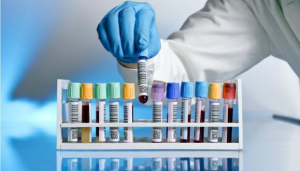
U.S. biopharmaceutical firm announced its decision to pay $11.9 billion for Kite Pharma, an Israeli biomed developing T-cell therapy that harnesses the body’s immune cells to attack malignant cells.
• This pharmaceutical acquisition is among the most spent for a company whose products have yet to be FDA approved.
By Zeev Klein, News Agencies & Israel Hayom Staff
Biopharmaceutical giant Gilead Sciences announced Monday that it has agreed to buy Israeli biomed company Kite Pharma for $11.9 billion in an all-cash deal. This acquisition marks one of the biggest ever deals for a company whose products have yet to be approved for marketing.
The Santa Monica, California-based Gilead will pay a reported $180 per share, reflecting a 29% premium on the market price. Kite’s shares, traded on the Nasdaq Stock Market, have jumped 291% since the beginning of the year.

Kite Pharma was founded by Israeli-American Professor Arie Belldegrun. The company develops a CAR-T, or chimeric antigen receptor T-cell therapy, which harnesses the body’s immune cells to recognize and attack malignant cells. A significant part of the technology on which the product is based was developed by Professor Zelig Eshhar of the Weizmann Institute of Science.
Belldegrun has two successful sales to his names: in 2007 he sold his startup Agensys, which was involved in genetic cancer mapping, to Japanese pharmaceutical company Astellas Pharma for $537 million, and in 2009 he sold Cougar Biotechnology, which develops cancer drugs, to global conglomerate Johnson & Johnson for $970 million.
Kite is currently waiting for U.S. Food and Drug Administration approval of its first product on an abbreviated track for innovative cancer products, following a successful trial on 100 patients. The company is considered one of the leading players in the emerging field of CAR-T, and is competing with rivals Novartis, Juno Therapeutics, and Bluebird Bio in a race to get the first approved therapy.
The FDA is expected to decide by Nov. 29 whether to approve Kite’s CAR-T, axi-cel, for treatment of adults with advanced lymphoma.
If approved, these drugs are expected to cost up to $500,000 and generate billions of dollars. Success would also help advance a cancer-fighting technique that scientists have been trying to perfect for decades.
“The final idea is that our treatment will revolutionize all forms of cancer treatment,” Belldegrun told the financial daily Calcalist in 2015, after Kite’s initial IPO. “Today, chemotherapy helps 10% of patients and causes side effects to 100% of patients. It will not work that way anymore. The treatment will be personalized against cancer cells in the body rather than against normal cells.”
According to financial daily Globes, Kite’s largest shareholders are U.S. funds Capital Group with almost 20% of the shares, BlackRock (7%) and JPMorgan Chase (4%). The main Israeli beneficiary of the acquisition is the Pontifax Fund, which invested $3.8 million in Kite at an early stage and has distributed Kite shares worth $120 million to its investors, including insurance and finance groups Menorah Mivtachim Holdings, Phoenix Holdings, Meitav Dash Investments, and Harel Insurance Investments and Financial Services.
Gilead has a market value of $96.36 billion. The company was once the world’s largest maker of HIV drugs, and in 2011 agreed to acquire hepatitis C drug developer Pharmasset for $11 billion. Last year, Gilead generated total sales of $30.39 billion, of which $14.8 billion came from hepatitis C treatments.
View original Israel Hayom publication at:
http://www.israelhayom.com/site/newsletter_article.php?id=44953






 Israeli New Shekel Exchange Rate
Israeli New Shekel Exchange Rate